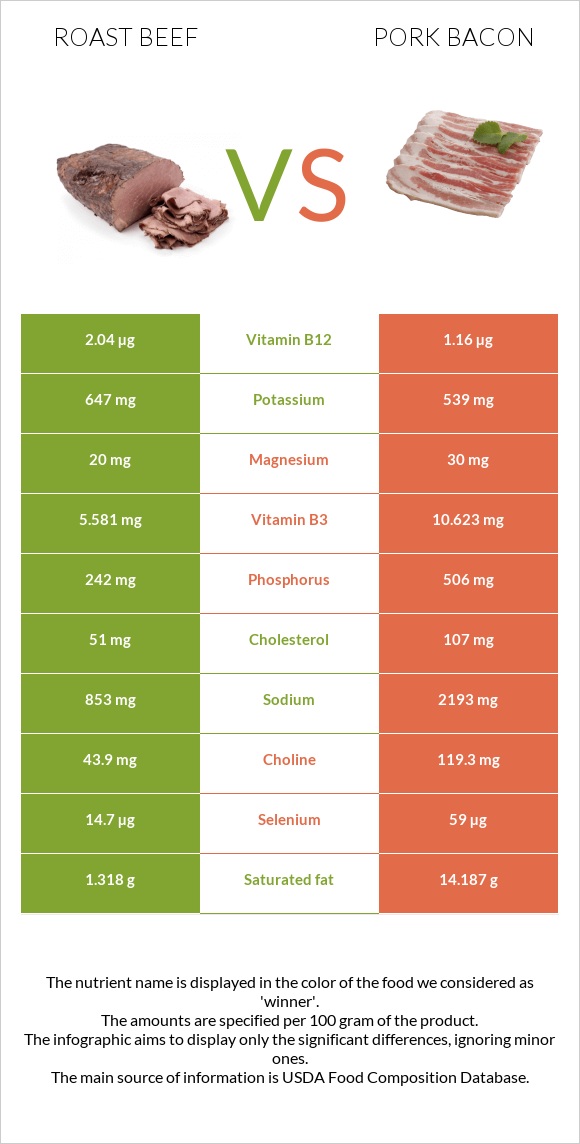Roast beef vs. Pork bacon — In-Depth Nutrition Comparison
Compare
Summary of differences between roast beef and pork bacon
- Roast beef has more vitamin B12 and vitamin B6, while pork bacon has more selenium, phosphorus, vitamin B3, vitamin B1, and choline.
- Pork bacon covers your daily need for selenium, 81% more than roast beef.
- Roast beef contains 2 times more vitamin B12 than pork bacon. While roast beef contains 2.04µg of vitamin B12, pork bacon contains only 1.16µg.
- The amount of cholesterol in roast beef is lower.
These are the specific foods used in this comparison Roast beef, deli style, prepackaged, sliced and Pork, cured, bacon, cooked, baked.
Infographic

Infographic link
Mineral Comparison
Mineral comparison score is based on the number of minerals by which one or the other food is richer. The "coverage" charts below show how much of the daily needs can be covered by 300 grams of the food.
| Contains more PotassiumPotassium | +20% |
| Contains more IronIron | +37.6% |
| Contains less SodiumSodium | -61.1% |
| Contains more MagnesiumMagnesium | +50% |
| Contains more CalciumCalcium | +100% |
| Contains more CopperCopper | +111.6% |
| Contains more PhosphorusPhosphorus | +109.1% |
| Contains more ManganeseManganese | +46.7% |
| Contains more SeleniumSelenium | +301.4% |
Vitamin Comparison
Vitamin comparison score is based on the number of vitamins by which one or the other food is richer. The "coverage" charts below show how much of the daily needs can be covered by 300 grams of the food.
| Contains more Vitamin EVitamin E | +53.1% |
| Contains more Vitamin B6Vitamin B6 | +48.9% |
| Contains more Vitamin B12Vitamin B12 | +75.9% |
| Contains more Vitamin KVitamin K | +1500% |
| Contains more FolateFolate | +150% |
| Contains more Vitamin AVitamin A | +266.7% |
| Contains more Vitamin B1Vitamin B1 | +709.3% |
| Contains more Vitamin B2Vitamin B2 | +17.8% |
| Contains more Vitamin B3Vitamin B3 | +90.3% |
| Contains more Vitamin B5Vitamin B5 | +82.5% |
All nutrients comparison - raw data values
| Nutrient |  |
 |
DV% diff. |
| Selenium | 14.7µg | 59µg | 81% |
| Fats | 3.69g | 43.27g | 61% |
| Sodium | 853mg | 2193mg | 58% |
| Saturated fat | 1.318g | 14.187g | 58% |
| Monounsaturated fat | 1.521g | 19.065g | 44% |
| Phosphorus | 242mg | 506mg | 38% |
| Vitamin B12 | 2.04µg | 1.16µg | 37% |
| Protein | 18.62g | 35.73g | 34% |
| Vitamin B3 | 5.581mg | 10.623mg | 32% |
| Polyunsaturated fat | 0.27g | 4.859g | 31% |
| Vitamin B1 | 0.043mg | 0.348mg | 25% |
| Calories | 115kcal | 548kcal | 22% |
| Cholesterol | 51mg | 107mg | 19% |
| Choline | 43.9mg | 119.3mg | 14% |
| Vitamin B6 | 0.46mg | 0.309mg | 12% |
| Copper | 0.086mg | 0.182mg | 11% |
| Vitamin B5 | 0.566mg | 1.033mg | 9% |
| Iron | 2.05mg | 1.49mg | 7% |
| Potassium | 647mg | 539mg | 3% |
| Vitamin B2 | 0.213mg | 0.251mg | 3% |
| Magnesium | 20mg | 30mg | 2% |
| Calcium | 5mg | 10mg | 1% |
| Zinc | 3.2mg | 3.36mg | 1% |
| Vitamin A | 3µg | 11µg | 1% |
| Vitamin E | 0.49mg | 0.32mg | 1% |
| Vitamin K | 1.6µg | 0.1µg | 1% |
| Folate | 5µg | 2µg | 1% |
| Net carbs | 0.64g | 1.35g | N/A |
| Carbs | 0.64g | 1.35g | 0% |
| Vitamin D | 1 IU | 0% | |
| Sugar | 0.29g | 0g | N/A |
| Manganese | 0.015mg | 0.022mg | 0% |
| Trans fat | 0.148g | 0g | N/A |
| Tryptophan | 0.299mg | 0% | |
| Threonine | 1.399mg | 0% | |
| Isoleucine | 1.676mg | 0% | |
| Leucine | 2.782mg | 0% | |
| Lysine | 2.964mg | 0% | |
| Methionine | 0.795mg | 0% | |
| Phenylalanine | 1.417mg | 0% | |
| Valine | 1.901mg | 0% | |
| Histidine | 1.343mg | 0% | |
| Omega-3 - EPA | 0.007g | 0g | N/A |
| Omega-3 - DHA | 0.001g | 0g | N/A |
| Omega-3 - ALA | 0.017g | 0.21g | N/A |
| Omega-3 - DPA | 0.012g | 0g | N/A |
| Omega-6 - Gamma-linoleic acid | 0.001g | 0g | N/A |
| Omega-6 - Dihomo-gamma-linoleic acid | 0.011g | N/A | |
| Omega-6 - Eicosadienoic acid | 0.002g | 0.199g | N/A |
| Omega-6 - Linoleic acid | 0.14g | 4.088g | N/A |
Macronutrient Comparison
Macronutrient breakdown side-by-side comparison
Protein:
18.62 g
Fats:
3.69 g
Carbs:
0.64 g
Water:
73.72 g
Other:
3.33 g
Protein:
35.73 g
Fats:
43.27 g
Carbs:
1.35 g
Water:
12.52 g
Other:
7.13 g
| Contains more WaterWater | +488.8% |
| Contains more ProteinProtein | +91.9% |
| Contains more FatsFats | +1072.6% |
| Contains more CarbsCarbs | +110.9% |
| Contains more OtherOther | +114.1% |
Fat Type Comparison
Fat type breakdown side-by-side comparison
Saturated fat:
Sat. Fat
1.318 g
Monounsaturated fat:
Mono. Fat
1.521 g
Polyunsaturated fat:
Poly. Fat
0.27 g
Saturated fat:
Sat. Fat
14.187 g
Monounsaturated fat:
Mono. Fat
19.065 g
Polyunsaturated fat:
Poly. Fat
4.859 g
| Contains less Sat. FatSaturated fat | -90.7% |
| Contains more Mono. FatMonounsaturated fat | +1153.5% |
| Contains more Poly. FatPolyunsaturated fat | +1699.6% |





